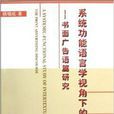《系統功能語言學視角下的互文性--書面廣告語篇研究(英文版)》由楊增成所著,本書是一項以書面廣告語篇為語料,從系統功能語言學的視角對互文性進行研究的成果。《系統功能語言學視角下的互文性--書面廣告語篇研究(英文版)》探討了互文性與語境間的關係,從概念功能和人際功能的角度分析了語篇中各個聲音間的關係,並且從功能語言學的角度研究了各個聲音間的連線機制。本書推動了互文性研究的發展,並能對廣告語篇的創作有一定的啟示意義。
基本介紹
- 書名:系統功能語言學視角下的互文性:書面廣告語
- 作者:楊增成
- 出版日期:2012年11月1日
- 語種:英語
- ISBN:9787516116784
- 外文名:A Systemic-Functional Study Of Intertextuality:The Print Advertising Discourse
- 出版社:中國社會科學出版社
- 頁數:230頁
- 開本:16
- 品牌:中國社會科學出版社
基本介紹,內容簡介,作者簡介,圖書目錄,
基本介紹
內容簡介
《系統功能語言學視角下的互文性--書面廣告語篇研究(英文版)》由楊增成所著,本書選擇書面廣告語篇作為研究語料。書面廣告語篇中存在著比較豐富的互文現象,但是對這些互文現象的研究尚不是很豐富。為了使語篇傳遞的內容更可信,廣告語篇中經常插入一些證人的話語。為了使廣告語篇能較長地留在讀者的記憶中,廣告語篇經常仿擬一些名篇。另外受社會文化語境的影響,廣告語篇往往用雙關的方式來表達一些信息。這些原因導致了廣告語篇中比較豐富的互文現象。
作者簡介
楊增成,北京師範大學博士,澳大利亞弗林德斯大學訪問學者,北京工商大學外國語學院副教授。主要研究興趣:功能語言學、語篇分析。目前發表學術論文10餘篇,主持教育部人文社會科學研究項目1項,主持北京市屬高等學校人才強教計畫資助項目1項。
圖書目錄
Chapter 1 Introduction
1.1 The Research Topic
1.2 Rationale for the Present Study
1.3 Objectives of this Research
1.4 Data and Methodology
1.5 Organization of this Book
Chapter 2 Previous Researches on Intertextuality
2.1 The Origin of the Theory of Intertextuality
2.2 The Literary Study of Intertextuality
2.3 The Study of Intertextuality in Arts
2.4 The Study of Intertextuality in Linguistics
2.5 The Linguistic Studies of Some of the Specific Forms of Inter—textuality
2.6 Summary
Chapter 3 A Systemic——Functional Model for the Study of Inter-
textuality
3.1 Approaches to Discourse Analysis
3.2 A Systemic—Functional Approach to Discourse Analysis
3.3 A Systemic—Functional Model for the Study of
Intertextuality
Chapter 4 The Relationship Between Intertextuality and Context
4.1 Contextual Variables
4.2 The Relationship Between Discourse and Context
4.3 The Contextual Factors for the PAD
4.4 The Relationship Between Intertextuality and Context
Chapter 5 The Experiential Meaning in the Discourse Involving
Intertextuality
5.1 The Dialogical Relations Among the Voices
5.2 The Experiential Meaning Expressed by Lexicon
5.3 Linguistic Analysis of Process
Chapter 6 The Interpersonal Meaning in the Discourse Involving
Intertextuality
6.1 The Participant Relationship
6.2 The Appraisals in the PAD
6.3 The Mood in the Discourse Involving Intertextuality
Chapter 7 Linking Different Voices in Discourses Involving Inter-textuality
7.1 Generic Structure
7.2 Texture
7.3 Linking Voices through Sentence Structure
7.4 Coherence in the Discourse Involving Intertextuality
Chapter 8 Conclusions
8.1 Major Findings
8.2 Implications
Bibliography
Acknowledgements
1.1 The Research Topic
1.2 Rationale for the Present Study
1.3 Objectives of this Research
1.4 Data and Methodology
1.5 Organization of this Book
Chapter 2 Previous Researches on Intertextuality
2.1 The Origin of the Theory of Intertextuality
2.2 The Literary Study of Intertextuality
2.3 The Study of Intertextuality in Arts
2.4 The Study of Intertextuality in Linguistics
2.5 The Linguistic Studies of Some of the Specific Forms of Inter—textuality
2.6 Summary
Chapter 3 A Systemic——Functional Model for the Study of Inter-
textuality
3.1 Approaches to Discourse Analysis
3.2 A Systemic—Functional Approach to Discourse Analysis
3.3 A Systemic—Functional Model for the Study of
Intertextuality
Chapter 4 The Relationship Between Intertextuality and Context
4.1 Contextual Variables
4.2 The Relationship Between Discourse and Context
4.3 The Contextual Factors for the PAD
4.4 The Relationship Between Intertextuality and Context
Chapter 5 The Experiential Meaning in the Discourse Involving
Intertextuality
5.1 The Dialogical Relations Among the Voices
5.2 The Experiential Meaning Expressed by Lexicon
5.3 Linguistic Analysis of Process
Chapter 6 The Interpersonal Meaning in the Discourse Involving
Intertextuality
6.1 The Participant Relationship
6.2 The Appraisals in the PAD
6.3 The Mood in the Discourse Involving Intertextuality
Chapter 7 Linking Different Voices in Discourses Involving Inter-textuality
7.1 Generic Structure
7.2 Texture
7.3 Linking Voices through Sentence Structure
7.4 Coherence in the Discourse Involving Intertextuality
Chapter 8 Conclusions
8.1 Major Findings
8.2 Implications
Bibliography
Acknowledgements

